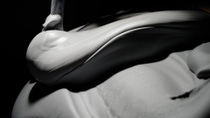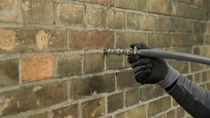Media
A class apart: BASF establishes an innovative material class in the insulation market with Cavipor® clay foam
- Mineral insulation material Cavipor® now also approved for floor slabs and roofs
- Product presentation at ‘Klimafestival für die Bauwende’ on November 19 and 20 in Berlin
Ludwigshafen, November 4, 2025 – With Cavipor®, BASF is establishing an innovative class of materials on the insulation market: clay foam. The mineral-based insulation system was specially developed for the energy-efficient renovation of existing buildings with double-wall masonry. Recently, Cavipor has also been approved for the insulation of floor slabs and roofs as filling between rafters. Thus, Cavipor enables thermal insulation across the entire building envelope.
"By establishing clay foam to the insulation market, we are setting a new benchmark for energy-efficient renovation solutions. Cavipor is a unique material that delivers substantial and sustainable benefits to the building insulation industry. It underscores BASF’s strong commitment to supporting the green transformation of the various customer industries we serve," said Dr. Ramkumar Dhruva, President of BASF’s Monomers division.
BASF works with a network of distributors in Europe who ensure the proper use of the clay foam by trained processors.
"Thanks to close cooperation with distribution partners in Germany, the Netherlands, Ireland and the UK, around 2,000 houses have already been insulated with Cavipor, and its presence as an innovative insulation alternative continues to grow across Europe. Cavipor can significantly improve the energy efficiency of a building, contribute to CO2 savings and promote a pleasant living environment," said Dr. Frank Reuter, Business Manager for Cavipor at BASF.
Cavipor is easy to transport and clean to process, with no dust or fibers produced. The insulating foam is made up of three water-based components that are mixed with air to increase their volume tenfold at the point of use, before being introduced into the hollow layer via small drill holes. The fluidity of the foam leads to an even filling of the cavities. Due to its unique properties, clay foam is both non-flammable and water-repellent, yet still vapor-permeable. This allows the building to withstand environmental influences and remain breathable. Thanks to its insulating effect, Cavipor belongs to the eligible thermal conductivity group 035 and meets the highest emission standards, awarded the EMICODE® EC1PLUS seal. During the renovation or dismantling of a building, Cavipor can be recycled or disposed of as a subgrade material in accordance with local regulations without the need for time-consuming separation from the rest of the construction waste.
BASF will present Cavipor and the innovative material class clay foam on November 19 and 20, 2025 at the fair ‘Klimafestival für die Bauwende’ in Berlin.
For more information about Cavipor, see www.cavipor.com
General information on the material class clay foam can be found under
www.clay-foam.com
About BASF
At BASF, we create chemistry for a sustainable future. Our ambition: We want to be the preferred chemical company to enable our customers’ green transformation. We combine economic success with environmental protection and social responsibility. Around 112,000 employees in the BASF Group contribute to the success of our customers in nearly all sectors and almost every country in the world. Our portfolio comprises, as core businesses, the segments Chemicals, Materials, Industrial Solutions, and Nutrition & Care; our standalone businesses are bundled in the segments Surface Technologies and Agricultural Solutions. BASF generated sales of €65.3 billion in 2024. BASF shares are traded on the stock exchange in Frankfurt (BAS) and as American Depositary Receipts (BASFY) in the United States. Further information at www.basf.com
P-25-224


